class: center, middle, inverse, title-slide # Week 03: Civil Wars ## Causes of Civil Wars <html> <div style="float:left"> </div> <hr color='#EB811B' size=1px width=800px> </html> ### Danilo Freire ### 24 September 2019 --- <style> .remark-slide-number { position: inherit; } .remark-slide-number .progress-bar-container { position: absolute; bottom: 0; height: 6px; display: block; left: 0; right: 0; } .remark-slide-number .progress-bar { height: 100%; background-color: #EB811B; } .orange { color: #EB811B; } </style> # Last week we saw that... .font150[ * Civil wars are crucial events in world history * They are hard to define: - Partisan bias (favour victims) - Political bias (war is not politics) - Urban bias (costly information, big narratives) - Selection bias (overaggregation, lack of context) ] --- # Last week we saw that... .font150[ * Violence is both an outcome and an instrument of civil wars * Even barbaric acts can be rational * Quantitative measures are somewhat arbitrary * PRIO/UCDP and ACLED - 25/1000 annual battle-related deaths - "contested incompatibility over territory or government and one of the parties is the state" ] --- # Last week we saw that... .font150[ * Three waves of civil war - Cold War: class-based conflicts, peasant rebellions - 1991-2003: ethnic conflicts - 2003-present: radical Islamism, but religion might not be the main cause ] --- class: inverse, center, middle # Causes of civil war <html><div style='float:left'></div><hr color='#EB811B' size=1px width=720px></html> --- # Collier and Hoeffler (2004) .font150[ * C&H argue political scientists put too much emphasis on motivations (grievances) * Grievances are more or less constant, so why do civil wars break only at a specific point in time?] -- .font150[ * *Window of opportunity*: people rebel _when they can_ * Greed: atypical circumstances that can generate large returns * Yet C&H agree they cannot differentiate between *opportunity* and *viability* to express grievances ] --- # Proxies for opportunity .font150[ * **Mineral resources**] -- .font150[ * Ratio of primary exports to GDP * Relationship is non-linear * Countries with very low and very high ratios do not have civil wars * **Question**: why? ] -- .font150[ * Countries with few natural resources have nothing to loot * Oil-rich countries can hold the country together by force * Countries in the middle are the best ones to loot ] --- # Proxies for opportunity .font150[ * **Money from diasporas**] -- .font150[ * E.g.: Tamil Tigers funded by American-resident Tamils * Immigrants provide money (and skills?) rebel groups wouldn't have otherwise * Proxied by % of immigrants living in the US ] --- # Proxies for opportunity .font150[ * **Funding from hostile governments**] -- .font150[ * Examples: - Algerian civil war (rebels supported by USSR/ France by the US) - Soviet-Afghan war (Sunni Mujahideen supported by US/PAK/CN, etc; Shia Mujahideen supported by Iran) - Syrian civil war (a mess!) ] --- # Proxies for opportunity .font150[ * **Low cost of fighting**] -- .font150[ * 1) Income is low: GDP per capita * 2) Weapons are cheap: previous wars * 3) Government is weak: montainous terrain * 4) Social cohesion: ethnic diversity ] --- # Proxies for grievance .font150[ * Ethnic and religious hatred: ethnic fractionalisation * Political repression: non-democracies * Political exclusion: ethnic dominance (majority group comprises 45-90% pop) * Economic inequality: Gini index, ratio top-to-bottom income ] --- # Opportunity model .center[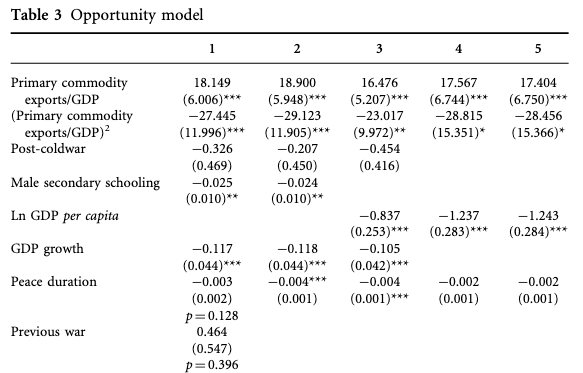] --- # Opportunity model .center[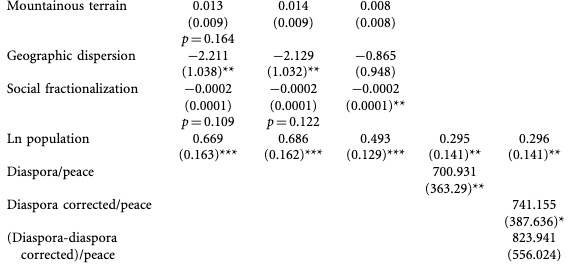] --- # Grievance model .font120[Drops economic variables from the model] .center[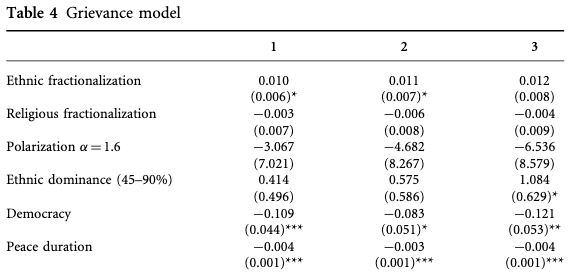] --- # Grievance model .center[] --- # Combined model <img src="ch05.png" width="1100px" height="400px" /> --- # Combined model <img src="ch06.png" width="1100px" height="400px" /> --- # Combined model <img src="ch07.png" width="1100px" height="400px" /> --- # Interpretation .font150[ * Factors that influence the opportunity for rebellion: - Money from commodities - Diaspora - Low GDP - Dispersed population * *No evidence for grievance-based theories* * Only ethnic dominance has a positive effect * **Question**: what do you think? Is their explanation convincing? ] --- # Comments .font150[ * No difference between rebels and criminals * GDP, democracy, primary exports change very slowly over time... what triggers conflict onset? * Urban bias: no mention of rural dynamics * Passive role of the state in the conflict * Crude proxies for greed and grievances ] --- # Fearon and Laitin (2003) .font150[ * Most cited paper in political science in the last 15 years * Remarkable data collection effort * Four main points: - The end of the Cold War *did not* cause civil wars - Controlling for income, ethnicity and religion don't matter - Little support for grievance-based theories - Factors that explain *insurgency* are the most relevant * Different from C&H, F&L argue that low GDP proxies for *state capacity* ] --- # Data .font150[ * Conflicts that kill at least 1,000 people, at least 100 per year, rebels or government forces * Include colonial wars * F&L are cautious about their data on empires * They analyse the data both including and excluding colonial wars ] --- # Conflicts over time .center[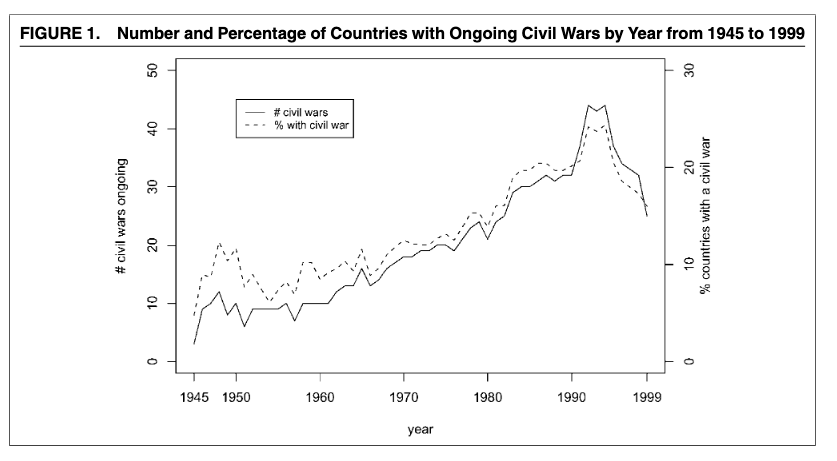] --- # Ethnicity and conflict .font150[ * F&L criticise the idea of "clash of civilisations" * Deep-rooted ethnic grievances are not enough to explain civil war onset * Sceptical of "modernisation theory": limits to upward mobility cause people to revolt * Question the idea that discrimination (ethnic or economic favouritism to other groups) leads to conflict ] --- # Insurgencies .font150[ * Focus on small guerrilla wars * Guerrilla groups are weak compared to the government * Factors that facilitate rebel group survival are very important - Montainous terrain (hideouts) - Local knowledge - Rural base - Weak state governance ] --- # Main results .center[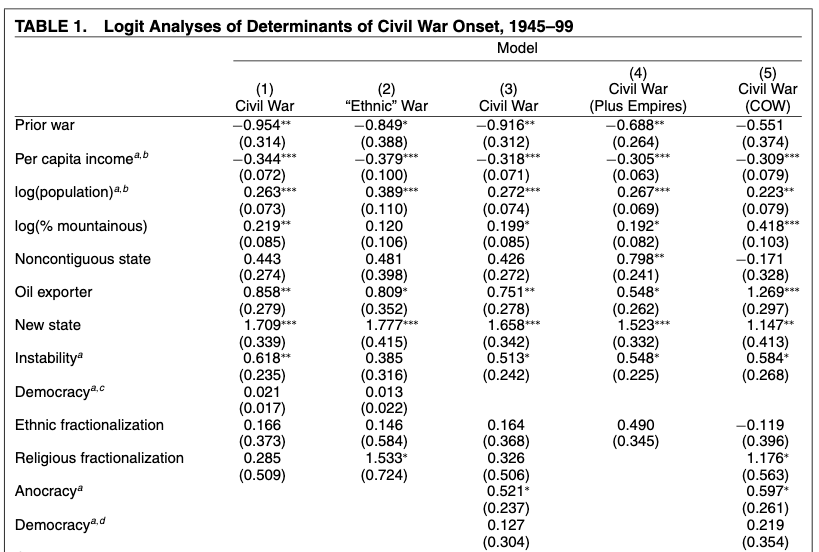] --- # Pred. probabilities: income and ethnicity .center[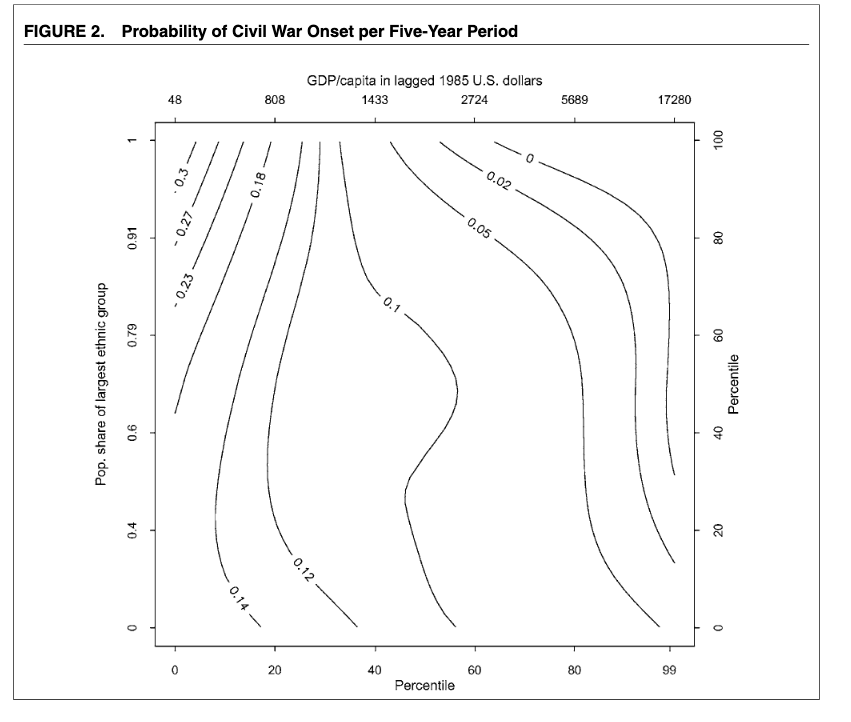] --- # Discussion .font140[ * The high number of civil wars in the 1990s is the result of accumulation of previous conflicts, not the end of the Cold War * Ethnicities and grievances do not explain why internal wars occur * Factors that favour *insurgency* do: state weakness, low GDP, instability, and large population * Practical implications: - Promoting democracy abroad doesn't work - Cultural dialogue doesn't work either - Little foreign states can do: GDP, state capacity take time ] --- # Comments on C&H and F&L .font150[ * C&H: *homo oeconomicus* goes to war * Rebels are essentially criminals: profits from looting * **Question**: natural/lootable resources can fuel grievances too, can't they? ] -- .font150[ * Resource-rich countries might have higher inequality, forced migrations, trade shocks, etc * Diasporas can also provide welfare to local communities and therefore *reduce* the likelihood of conflict ] --- # Comments on C&H and F&L .font150[ * F&L: unclear which aspect of state capacity decreases civil war risk: Inclusive institutions, shared power, armed forces, economic redistribution? * Impossible to adjudicate between their theory (state capacity, proxied by GDP per capita) and C&H's (lootable resources, proxied by.... GDP per capita!) * As with C&H, national-level data obscures important within-country dynamics ] --- class: inverse, center, middle # Questions? <html><div style='float:left'></div><hr color='#EB811B' size=1px width=720px></html> --- # Wimmer et al (2009) .font150[ * Ethnicity *does* play a role in civil war outbreaks * Qualify previous literature * Offer better data on ethnic groups * Establish new mechanisms that link group grievances to conflicts * Focus on political dynamics of ethnic exclusion and competition ] --- # Institutionalist, configurational theory .font150[ * **Institutionalist**: political structures create incentives for players to act strategically * **Configurational**: the same institution provides different incentives according to the distribution of power * Ethnicity matters _because the nation state uses it for legitimacy_ * Politicians have incentives to favour their co-ethnics * Ethnic favouritism is more likely in poor, young states (which need more legitimacy) ] --- # Institutionalist, configurational theory .center[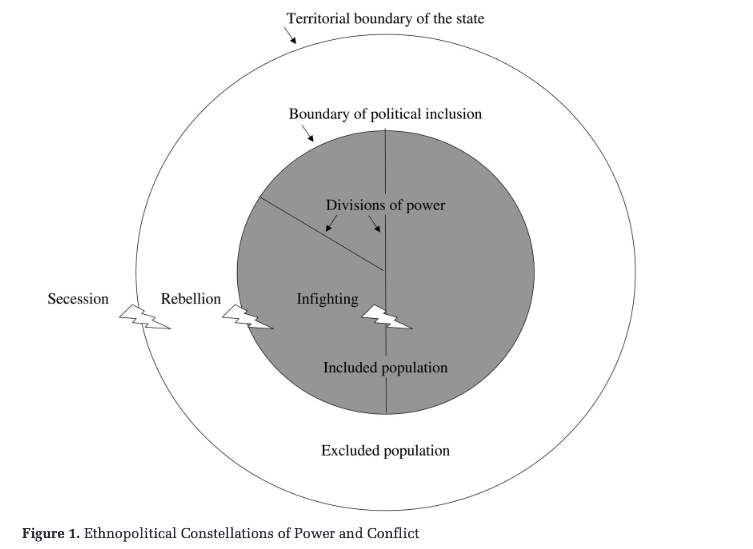] --- # Three types of ethnic conflict .font150[ * **Secession**: changing the territorial boundaries of a polity and can be pursued by both excluded and included groups * **Rebellion**: excluded segments of a population fight to shift the boundaries of inclusion * **Infighting**: elite disputes for the spoils of government * Predictions: - ethnic exclusion breeds conflict - more power-sharing increase conflict (coalitions) - large states and those under indirect rule rebel more ] --- # Results .center[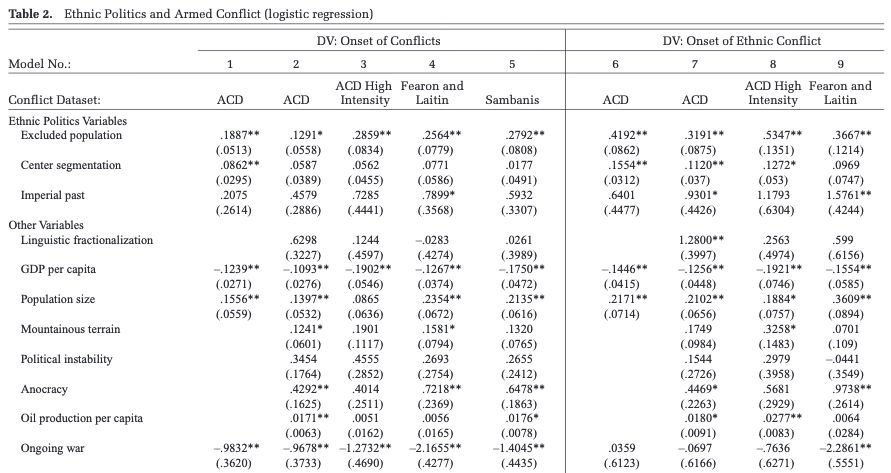] --- # Results .center[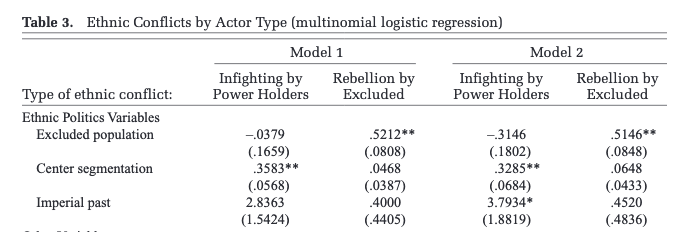] --- # Results .center[] --- # Conclusion .font150[ * "The likelihood of armed confrontation increases as the center of power becomes more ethnically segmented and as greater proportions of a states population are excluded from power because of their ethnic background" * "These conflicts are even more likely in incoherent states where the population is not accustomed to direct rule by the political center" * "Ethnicity is not an aim in itself, but the organizational means through which individuals struggle to gain access to state power" ] --- # Comments on Wimmer et al .font150[ * Good idea to focus on ethnicity and power dynamics * However, still treats ethnicity as a fixed category * Ethnicity and conflict can be endogenous * Urban bias, maybe? ] --- class: inverse, center, middle # Questions? <html><div style='float:left'></div><hr color='#EB811B' size=1px width=720px></html> --- # Kalyvas and Balcells (2010) .font150[ * Do systemic factors play a role in civil war dynamics? * More specifically, what is the role of the international system in civil wars? * "Technologies of rebellion": ways that civil conflicts are fought * Disaggregating the types of conflict * The end of the Cold War caused a decline in irregular wars ] --- # Technologies of rebellion .font150[ * **Irregular warfare**: guerrillas * **Conventional warfare**: army and rebels have similar power * **Symmetric non-conventional (SNC) warfare**: states unable/unwilling to fight ("primitive" wars) ] --- # The puzzle of the Cold War .font150[ * Civil wars were understood as proxy wars * End of the Cold War brought changes to the int'l system: - End of multiethnic states - Emergence of new states - Cheap weapons from the former USSR - Weakening of client states - No legitimising principle to the state (link with Wimmer et al.) * Contest F&L's results that the Cold War has no effect ] --- # Technologies of rebellion .center[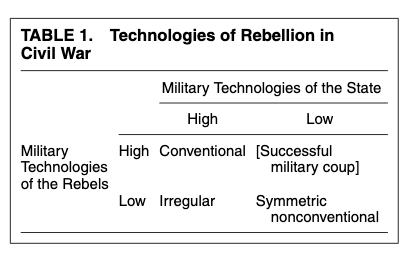] --- # Summary statistics .center[] --- # Main results .font150[ * 1 for conventional wars, 2 for irregular wars, and 3 for SNC wars. ] .center[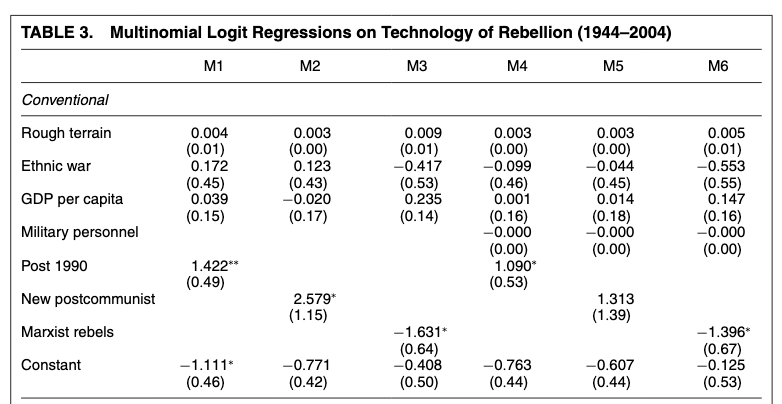] --- # Main results .center[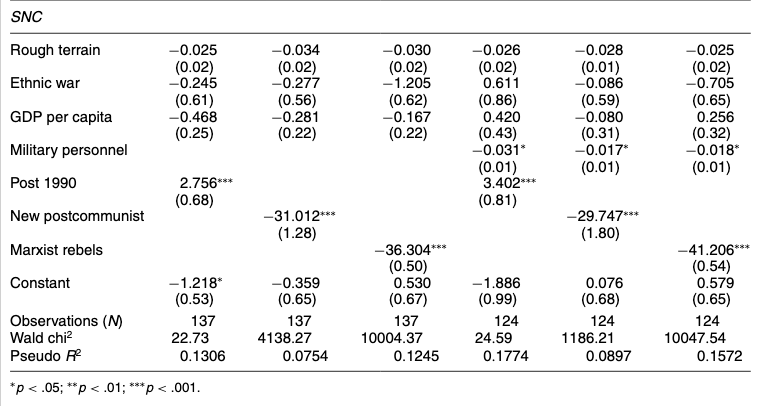] --- # Discussion .font150[ * Indeed the "technologies of rebellion" had been overlooked * However, the model doesn't seem very convincing * Almost nothing is significant; bad control variables * No testing of any mechanism: - Material support - Ideological cohesion - Access to weapons * SNC is a poorly-defined category ] --- # Ward et al (2010) .font150[ * Statistical models explain what has already happened (duh!) * How useful are they to predict *what might happen in the future*? * In-sample vs out-of-sample testing * Predictive accuracy: Possible means for testing the validity of a theory ] --- # Problems of statistical significance .font140[ * False positives and false negatives - Every probability above 0.5 is considered positive in the model - There is *nothing* special about that number * **Question**: - You are the leader of your country and you see that country X has 50% chance of going to war next year. If you are right, a civil war can be averted. *But if you are wrong*, you will invade another country, your citizens will die, and conflict might spread. What probability would make *you* go to war? ] --- # Statistical vs predictive power .center[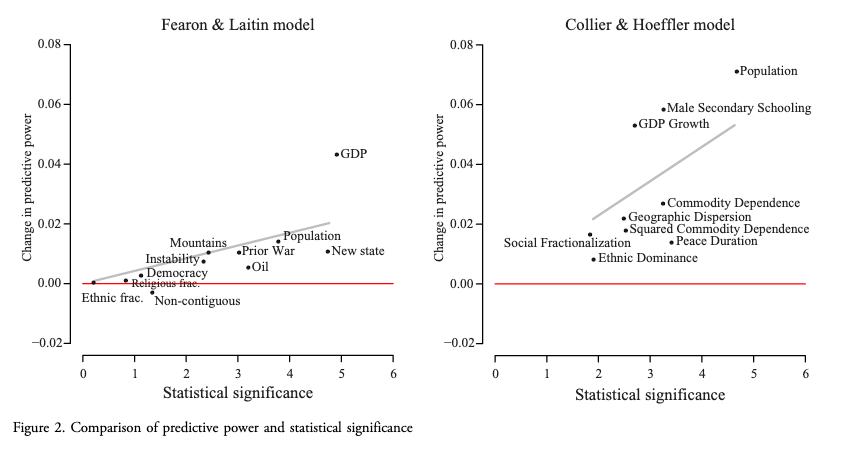] --- # Discussion .font150[ * Statistically significant variables have little predictive power * How can we use these models to predict new conflicts? * Factors that explain previous civil wars may not explain future ones * Prediction can help us build more robust (although not necessarily more efficient) models for civil war prevention ] --- class: inverse, center, middle # Questions? <html><div style='float:left'></div><hr color='#EB811B' size=1px width=720px></html> --- # Brief summary .font150[ * Civil wars happen in poor, weak states * Windows of opportunity are more important than old grievances * Ethnic rivalries can lead to civil war outbreak, but under certain conditions * The Cold War has changed the way civil wars are fought * Many of the variables we know explain *past* wars, but can they explain future ones? ] --- # Similar analysis .center[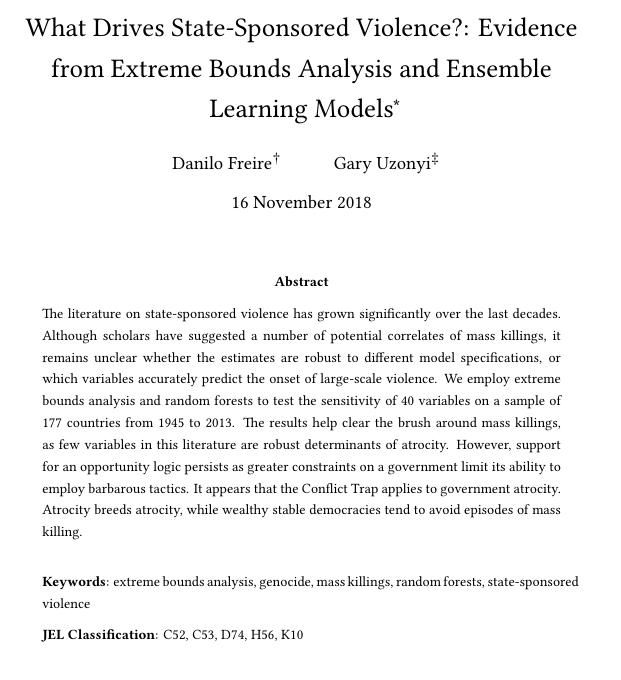] --- # To conclude .center[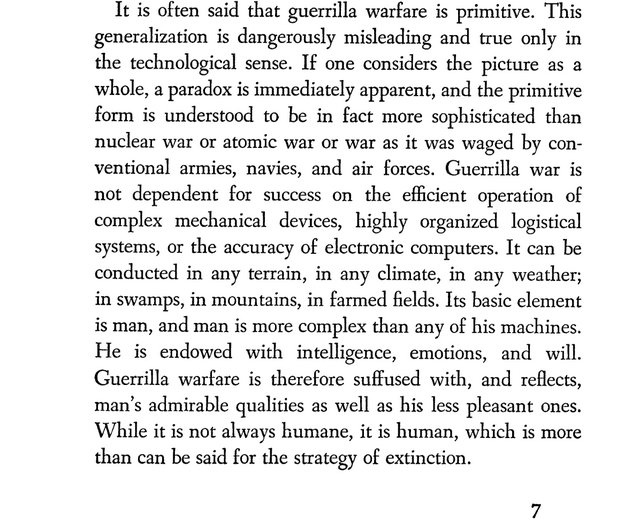] .center[Source: [Griffith, S. B. - Introduction to Mao Zedong's *On Guerrilla Warfare* (1961)](https://books.google.com/books?id=jKoqAwAAQBAJ&lpg=PA7&dq=griffith%20%22its%20basic%20element%20is%22&pg=PA7#v=onepage&q&f=false)] --- class: inverse, center, middle # See you next week! <html><div style='float:left'></div><hr color='#EB811B' size=1px width=720px></html>